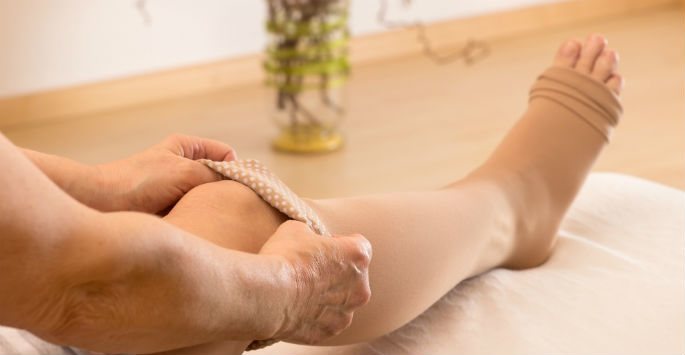A compression stocking is a medical device that is designed to improve the blood flow in your legs. As the name suggests, a compression stocking improves blood flow by adding extremal pressure on your legs, typically stronger by the feet and ankles and less as it goes up the leg/thigh. This “gradient compression” encourages the blood to move up your legs and makes it harder for blood to pool in the lower legs due to the constant pull of gravity. Compression stockings help reduce swelling and in some cases can minimize the risk of developing blood clots.
How a Compression Stocking Affects Your Health
Since the compression stockings act effectively as “anti-gravity-socks”, many patients notice that while using them; their legs do not feel as achy or heavy. They also often notice a decrease in leg swelling.
Compression stockings vary in the amount of pressure they deliver; some only apply a light pressure…those are typically the over-the-counter variety. Prescription-grade compression stockings typically start with a pressure of 20-30 mmHg. Stockings vary in length, with some only coming up to the knee, and others going all the way up to your hip. They also vary in colors, allowing you to select a color that works the best with your skin tone and your wardrobe.
During a patient’s consultation visit at Rosen Vein Care, Dr. Rosen will determine whether compression stockings will be required to address a particular patient’s needs.
How Should You Wear a Compression Stocking?
Putting compression stockings on can be tricky, but we have found some handy tips and tricks to make it simple, easier and require less effort. Dr. Rosen’s assistant, Maria, spends time patiently explaining all of these tips to each patient.
Given the fact that gravity is the enemy, compression stockings should ideally be worn for the entire day while a patient is up and active. At times, stockings may be required to be worn overnight.
Once you get the stockings in place, smooth out any wrinkles. It is important that you do not allow the stocking to wrinkle or to bunch up, as this could create a “tourniquet” effect and may negatively impact circulation and make your leg uncomfortable.
Compression stockings play an important part in the treatment process for varicose veins and spider veins. While many vein treatments may be coverable by insurance and Medicare, most insurance policies require a patient to go through a trial period of “conservative management” with compression stockings before coverage would be considered by the insurance carrier. This trial period may range from weeks to months.
Given this little-known fact, it’s important for patients to be evaluated for vein disease as soon as possible to have sufficient time to get approval and perform treatments during this calendar deductible year.
Call Rosen Vein Care today at 847-272-8346 to schedule your consultation appointment. Dr. Rosen and staff are here to determine your treatment needs and to help you obtain the insurance coverage you deserve. We look forward to helping your legs feel and look better than they have in years!

